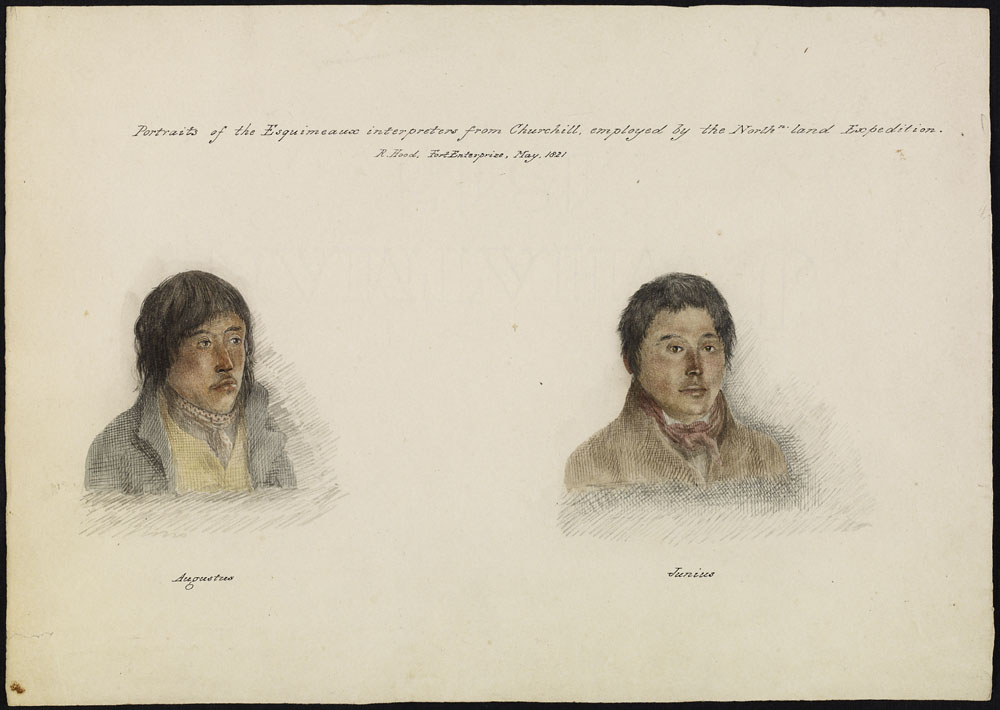It has been widely discussed if the killing of Michel Terohuate, the Iriquois who killed the Midshipman Robert Hood during the Franklin Coppermine expedition (breath), was an unavoidable execution or just a murder. Williard Wentzel appealed then for a formal investigation but he was basically ignored. However, it has been forgotten the fact that not too many days before this happened, the Inuit Junius (Hoeootoerock-"The ear") was merely and apparently abandoned while he was hunting to feed the party. Franklin and the men had been stopped by the course of the Coppermine river on their way back to Fort Enterprise. They hadn't boats to cross the river so they were detained for sometime to build a small one and then they crossed the rapids leaving Junius behind.
| Junius and Augustus http://prints.royalsociety.org/art/579215/inuit-interpreters-junius-l-and-augustus-r |
 |
| Augustus and Junius http://collectionscanada.gc.ca/pam_archives/index.php?fuseaction=genitem.displayItem&lang=eng&rec_nbr=4730700 |
Just before crossing Junius shots were heard by Credit (one of the voyageurs) who had been sent to hunt with him. His mate, Augustus told Franklin not to worry about him because he surely would manage to survive the winter by his own.
The fact that Augustus after crossing the river marched always onwards and always separated from the main body of the group is significative. He managed not only to reach Fort Enterprize but to reach Akaitcho camp before than the rest of the pary safe and sound. He likely prefered or even forced that not stay with the rest of the party, which surely was considered by him as a deadly burden.
If the disspeareance of Junius was previously planned by the inuit couple or just by himself or if it must be considered an abandonment and therefore a crime, is a matter of conjecture and reflection. Junius was by then well equipped with enough ammunition, blankets, knives and a kettle. If someone was predestined to survive through all those harsh conditions those were the inuit people, they were survivors by nature, they were get used to overcome worst conditions than the ones they were suffering. They knew perfectly well how to live and survive a winter. There is a number of stories about indian women who survived whole winters in the northern arctic by their own after being abadoned by their tribes. Franklin himself tells one of these stories in his narrative of this journey.
 |
| http://ottawacitizen.com/news/local-news/no-arctic-amateur-franklin-artifacts-reveal-forgotten-side-of-explorer |
A lonely but well prepared man, as Junius surely should be considered, had more chances to survive than twenty badly prepared men. My guess and bet is that Junius survived that winter and that he likely reached some Fort or indian camp. We will never know, he could have even come back to the north in the spring and joined again the Inuit people who they met in Bloody falls. We should remember that Augustus was offered a bribe to stay with the old man (White Fox) who they talked to when they reached the inuit camp of Bloody Falls the summer of 1821. That bribe consisted on offering Augustus the daughter of the old man.
Augustus was latter contracted for subsequents overland expeditions. His achievements piled stuff enough to feed another blog post. He gained a position in several accounts and even a place of honour in the Dictionary of Canadian Biography.
And for Junius, Franklin mentions only cursoryly how they were worried about his whereabouts, but not too dramatically in my opinion. He didn't express any remorse and it doesn't seem he had even thought on staying there longer to wait for him. On the other hand, the voyageurs and Augustus were confident about his chances of survival. He was a good hunter, his achievements are described here and there in the Franklin's narrative. Why then should we think otherwise? He could have found a wife in one of the inuit settlements located north of point lake or he could have just died alone of starvation, being attacked by wolves or have fallen ill in some place east of the Coppermine river. In that latter case his body would be feeding the massive graveyard which the arctic would become whithin the coming years.
And for Junius, Franklin mentions only cursoryly how they were worried about his whereabouts, but not too dramatically in my opinion. He didn't express any remorse and it doesn't seem he had even thought on staying there longer to wait for him. On the other hand, the voyageurs and Augustus were confident about his chances of survival. He was a good hunter, his achievements are described here and there in the Franklin's narrative. Why then should we think otherwise? He could have found a wife in one of the inuit settlements located north of point lake or he could have just died alone of starvation, being attacked by wolves or have fallen ill in some place east of the Coppermine river. In that latter case his body would be feeding the massive graveyard which the arctic would become whithin the coming years.

No hay comentarios:
Publicar un comentario